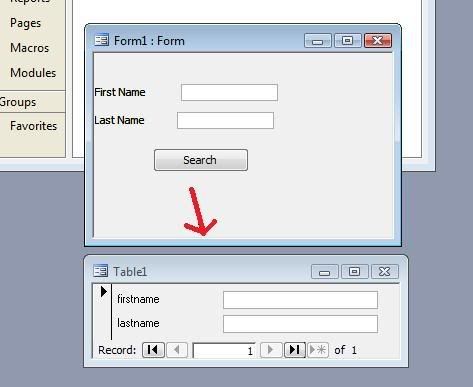The OpenForm method carries out the OpenForm action in Visual Basic.
expression.OpenForm(FormName, View, FilterName, WhereCondition, DataMode, WindowMode, OpenArgs)
expression Required. An expression that returns one of the objects in the Applies To list.
FormName Required Variant. A string expression that's the valid name of a form in the current database. If you execute Visual Basic code containing the OpenForm method in a library database, Microsoft Access looks for the form with this name first in the library database, then in the current database.
View Optional AcFormView.
AcFormView can be one of these AcFormView constants.
acDesign
acFormDS
acFormPivotChart
acFormPivotTable
acNormal default. Opens the form in Form view.
acPreview
If you leave this argument blank, the default constant (acNormal) is assumed.
FilterName Optional Variant. A string expression that's the valid name of a query in the current database.
WhereCondition Optional Variant. A string expression that's a valid SQL WHERE clause without the word WHERE.
DataMode Optional AcFormOpenDataMode. The data entry mode for the form. This applies only to forms opened in Form view or Datasheet view
AcFormOpenDataMode can be one of these AcFormOpenDataMode constants.
acFormAdd The user can add new records but can't edit existing records.
acFormEdit The user can edit existing records and add new records.
acFormPropertySettings default
acFormReadOnly The user can only view records.
If you leave this argument blank (the default constant, acFormPropertySettings, is assumed), Microsoft Access opens the form in the data mode set by the form's AllowEdits, AllowDeletions, AllowAdditions, and DataEntry properties.
WindowMode Optional AcWindowMode. The window mode in which the form opens.
AcWindowMode can be one of these AcWindowMode constants.
acDialog The form's Modal and PopUp properties are set to Yes.
acHidden The form is hidden.
acIcon The form opens minimized in the Windows taskbar.
acWindowNormal default The form is in the mode set by its properties
If you leave this argument blank, the default constant
(acWindowNormal) is assumed.
OpenArgs Optional Variant. A string expression. This expression is used to set the form's OpenArgs property. This setting can then be used by code in a form module, such as the Open event procedure. The OpenArgs property can also be referred to in macros and expressions.
For example, suppose that the form you open is a continuous-form list of clients. If you want the focus to move to a specific client record when the form opens, you can specify the client name with the openargs argument, and then use the FindRecord method to move the focus to the record for the client with the specified name.
This argument is available only in Visual Basic.
Remarks
For more information on how the action and its arguments work, see the action topic.
The maximum length of the wherecondition argument is 32,768 characters (unlike the Where Condition action argument in the Macro window, whose maximum length is 256 characters).
You can leave an optional argument blank in the middle of the syntax, but you must include the argument's comma. If you leave a trailing argument blank, don't use a comma following the last argument you specify.
Example
The following example opens the Employees form in Form view and displays only records with King in the LastName field. The displayed records can be edited, and new records can be added.
DoCmd.OpenForm "Employees", , ,"LastName = 'King'"


